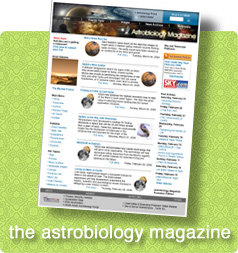
"What are the chances of a biochemistry occuring on Titan--even though temperatures are very small."
-
Making Sense of Mars Methane
Research on methane at a Mexican salt flat could help reveal the source of methane that has been detected in the atmosphere of Mars. But first scientists have to decipher the unique – and seemingly contradictory – isotopic signature of the Mexican methane.
-
New Round of Exo-Evo Grants Awarded
NASA’s Exobiology and Evolutionary Biology Program has made 35 new grant awards for research into the origin and early evolution of life, the potential of life to adapt to different environments, and implications for life elsewhere. Areas of research emphasis in the Exobiology and Evolutionary Biology Program, one of four elements of the Astrobiology Program, are planetary conditions for life, prebiotic evolution, early evolution of life and the biosphere, and evolution of advanced life.
Planetary conditions for life will be...
-
Molybdenum and the Rise of Complex Life
Researchers from NASA’s Exobiology and Evolutionary Biology Program have found a potential link between the presence of the element molybdenum in the ancient oceans on Earth and the expansion of complex life. Using molybdenum in ancient rocks as a proxy for the oxidation state of the early oceans, Clint Scott and Tim Lyons of the University of California-Riverside, Andrey Bekker of the University of Manitoba, and Ariel Anbar of Arizona State University found a period in time when...
-
Biologists Surprised To Find Parochial Bacterial Viruses
Biologists examining ecosystems similar to those that existed on Earth more than 3 billion years ago have made a surprising discovery: Viruses that infect bacteria are sometimes parochial and unrelated to their relatives in other parts of the globe.
-
New Astrobiology Roadmap Due in '08
A team of NASA and external representatives of the science community is in the process of updating NASA’s 2003 astrobiology roadmap. A draft revised roadmap, to be finalized later in 2008, is publicly available for review and comment online here.
The last iteration of the roadmap was issued in September 2003. The fundamental questions framing the roadmap – How does life begin and evolve? Does life exist elsewhere in the universe? What is the future of life on Earth...
-
Astrobiology Prospects ROSE-y
The Astrobiology Program has a bigger budget in fiscal year (FY) 2008 (which began October 1, 2007) than it did for FY 2007, thanks to NASA Associate Administrator for Science Alan Stern and Planetary Sciences Division Director Jim Green. In one of his first actions at NASA, Stern allocated $1 million of his discretionary funds to the NASA Astrobiology Institute (NAI) to provide for continuity of membership beyond calendar year 2008. In additional action, Green allocated...
-
Astrobiology Researchers Earn Kudos
Four researchers whose work is supported by NASA’s Astrobiology Program were singled out for recognition by their scientific peers last year. Norman R. Pace, Mitchell L. Sogin, John P. Grotzinger, and Nora Noffke all received awards in 2007 for their contributions to science.
Norman Pace, professor of molecular, cellular, and developmental biology at the University of Colorado in Boulder, earned the American Society for Microbiology (ASM) 2007 Abbott-ASM Lifetime Achievement Award for outstanding contributions to...
